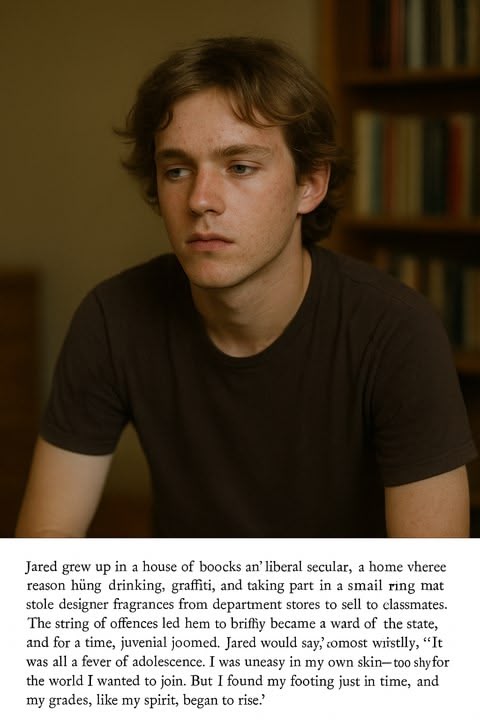He was a wild kid who always got into trouble
Jared grew up in a house of books and arguments, an academic, liberal, and largely secular home where reason hung in the air like moist breath on glass, and the world outside seemed at once vast and narrow. Yet even in that close, frankly intellectual household, a strange, awkward restlessness began to stir in him—a boy’s rebellion, unfocused yet tingling with the wet energy of youth.
In high school he strayed toward trouble, carried by a fleet, busy current of defiance: underage drinking, graffiti sprayed on tiled walls, the theft of glistening, carnal fragrances from department stores—shameless trophies of a punk’s vanity, sold in hallways thick with laughter and possible danger. For a time he became a brief, standing ward of the state, a boy on the edge of the barren, steel-ribbed machinery of juvenile justice, his future smothered beneath the weight of his own mistakes.
Then, by the grace of a weary, perhaps self-conscious judge, mercy intervened. Looking back, Jared would recall that season of chaos with a kind of dry-stone honesty: “It was all a fever of adolescence,” he said. “I was uneasy, shy, acned, uncomfortable in my own skin—a young, superbly tanned pretender to courage. But I changed my ways just in time, and my grades—like my spirit—began to rise again, live and flush of health, from the darkened, cavernous basement of my mistakes.”
In high school he strayed toward trouble, carried by a fleet, busy current of defiance: underage drinking, graffiti sprayed on tiled walls, the theft of glistening, carnal fragrances from department stores—shameless trophies of a punk’s vanity, sold in hallways thick with laughter and possible danger. For a time he became a brief, standing ward of the state, a boy on the edge of the barren, steel-ribbed machinery of juvenile justice, his future smothered beneath the weight of his own mistakes.
Then, by the grace of a weary, perhaps self-conscious judge, mercy intervened. Looking back, Jared would recall that season of chaos with a kind of dry-stone honesty: “It was all a fever of adolescence,” he said. “I was uneasy, shy, acned, uncomfortable in my own skin—a young, superbly tanned pretender to courage. But I changed my ways just in time, and my grades—like my spirit—began to rise again, live and flush of health, from the darkened, cavernous basement of my mistakes.”

